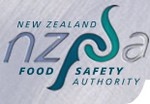Importer Alert: Dried plum products with high levels of lead
NZFSA advises importers that the Texas Department of State Health Services has found high levels of lead in certain imported dried plum products. Products include salted, candied, dried and preserved plums and prunes. The levels of lead found in the products tested in Texas do not comply with the Joint Australia New Zealand Food Standards Code.
Lead can accumulate in the body over time. Consumption of too much lead can cause health problems, including delayed mental and physical development and learning deficiencies. Pregnant women, infants and young children especially should avoid exposure to lead.
NZFSA reminds importers of their responsibility under the Food Act 1981 for ensuring that all food they import is safe and suitable for human consumption.
More information is available online from the US FDA websiteand the Texas Department of State Health Services website
Importers and retailers: what you can do
You should do five things to show you are managing risks to food safety and suitability:
1. If you import dried plum products, check the companies and products involved in the US (at the link above) to see if the products you import might be affected.
2. If your products are identified on the list above we recommend importers and retailers withhold and remove the product from sale, notify your supplier and NZFSA onimport.systems@nzfsa.govt.nz
3. As part of sourcing product you should seek assurances from your suppliers that the dried plum products they supply to you do not contain lead and source from a regulated environment. This is in addition to the usual requirements of the Food (Importer General Requirements) Standard 2008. An assurance is a written statement that the food is safe for human consumption and does not contain contaminants (such as lead) or other hazards such as physical contaminants or pathogens.
• An assurance may be an email, letter or fax. It must be signed by an authorised person in the supplying company. An assurance may be a Certificate of Analysis (CoA) that includes results of laboratory tests.
• Check that the assurance or test results are specific to the food you have purchased and imported by matching up product codes and batch numbers. Make sure that test results are from a reputable source, such as a laboratory accredited to ISO 17025 or similar, and signed by an authorised person, such as a Laboratory Supervisor or Laboratory Manager.
• Importers should source products from a regulated environment, and obtain other evidence that the supplier is able to provide safe and suitable food that has been exported legally from the country of origin. More information is available when sourcing food from a regulated environment.
4. Keep traceability records. You should be able to identify your food and trace it forward to customers you have sold the food to and back to suppliers who you purchased it from. Traceability records are important for tracking the sale and distribution of food if it needs to be recalled from the market.
5. Have a recall procedure. A recall procedure will help you manage a food recall in the event you need to remove food from the market. Information to help you develop a recall policy and procedure is available at processed food & retail sale - recalling food
